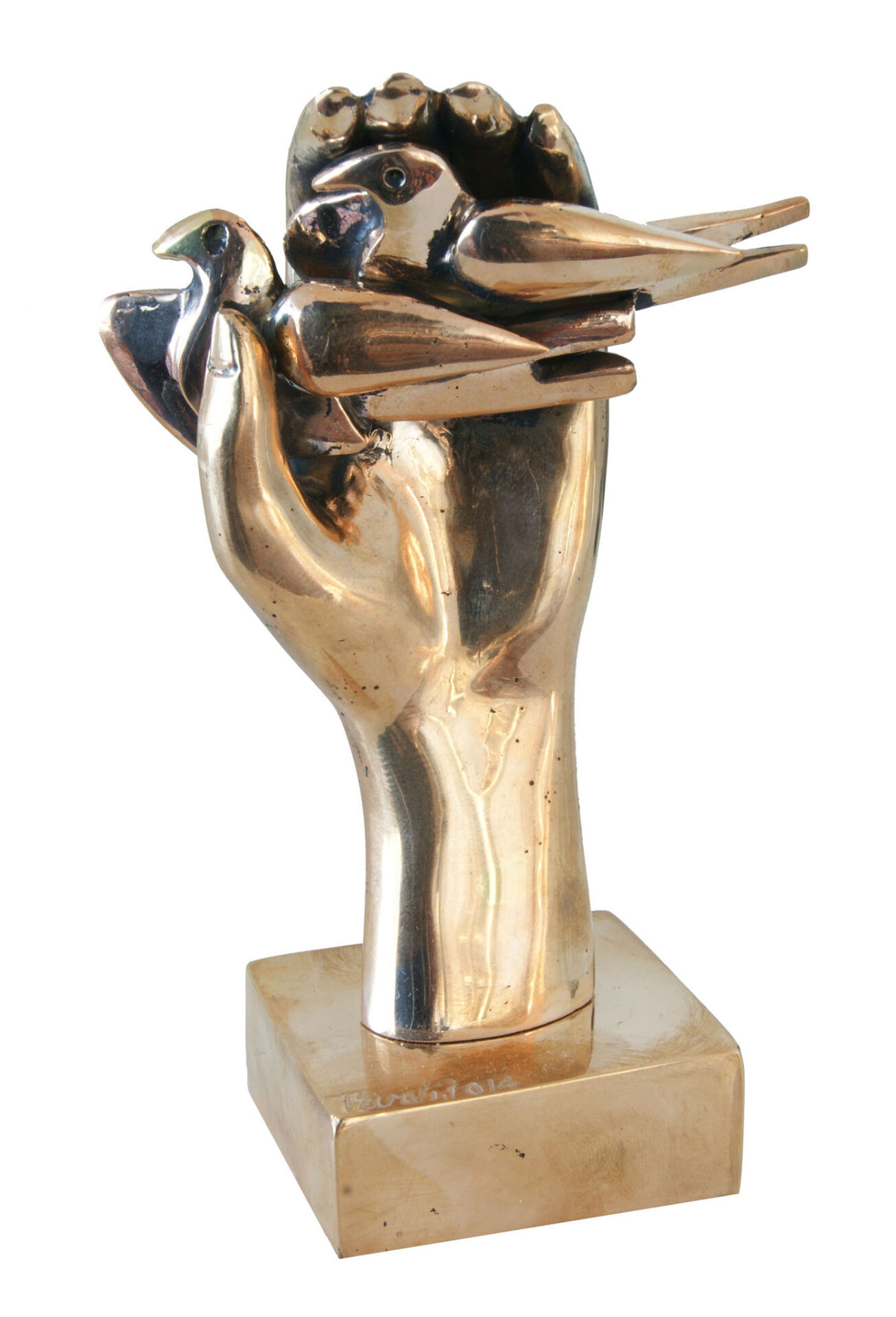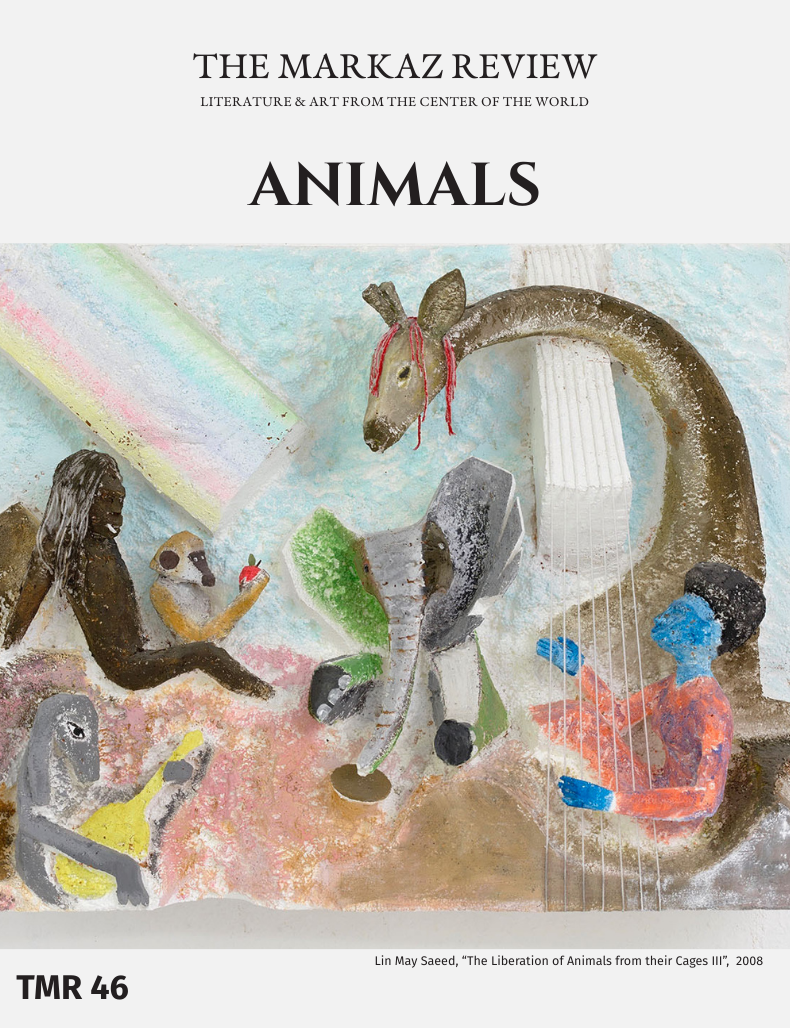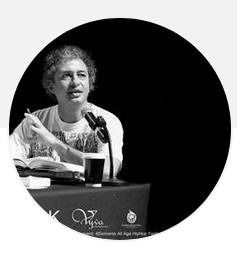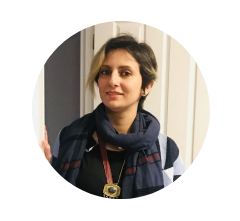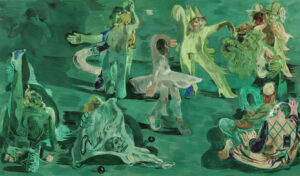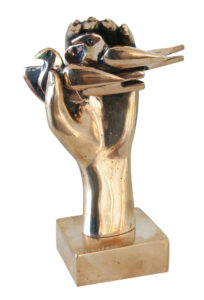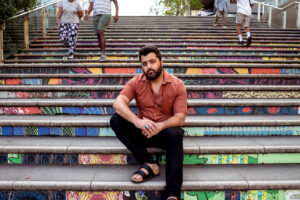The feature documentary Behrouz tells the story of Behrouz Boochani, the Kurdish journalist who fled the Iranian regime, and sought asylum in Australia in 2013. A month after his arrival in Australia by boat, Behrouz was transferred to Manus Island Detention prison on Papua New Guinea, where he spent six years locked away. His reporting and writings from prison, using a smuggled mobile phone, brought to international attention the cruel reality of detainees’ lives on Manus. His memoir, No Friend but the Mountains, was written on his mobile phone while in detention. Freedom, Only Freedom: The Prison Writings of Behrouz Boochani is a collection of his writings, alongside essays by human right activists. In the anthology, Boochani remembers an inmate in Manus prison who suffered the inhospitable conditions with the rest of them, yet this man found solace in befriending animals.
Freedom, Only Freedom: The Prison Writings of Behrouz Boochani by Behrouz Boochani, edited and translated by Moones Mansoubi & Omid Tofighian
Bloomsbury, 2023
ISBN 9780755642656
“The man who loves ducks.” This phrase describes Mansour Shoushtari with poetic resonance, this is the epithet by which he is known in Manus prison. Shoushtari is a 43-year-old man from Iran who has become a well-known personality in Manus prison. He comes across as someone full of joy and with a sensibility particular to the way children engage with the world.

He is someone whose presence in Manus prison is a paradox; that is, his very being conflicts with the prison in fundamental ways. Shoushtari’s personality projects beauty, he projects tenderness, he projects kindness; his existence is in opposition to the violence of Manus prison, in opposition to the power of the prison, in opposition to the barbarity of the prison.
Four years ago, Shoushtari managed to reach Christmas Island but the Australian government exiled him to Manus Island straight after, where he has been detained ever since. He has now been granted refugee status and has been waiting to be resettled in a safe country for years.
Shoushtari is an animal rights activist; a strange role to take for an imprisoned individual. He continues to support animals in the same way he once did back in Iran.
At sunset he puts the leftover food from the dining area onto a plastic dish and gives it to the crabs that live underneath the containers and tents. When I asked him why he feels obliged to feed the crabs he gave me a look that made me feel embarrassed for questioning him. He said: “The crabs have been living here on this island for ages — they were here before the prison was built. However, by constructing this prison we humans have violated their territory. They have every right to eat our food.”
In my view if a human being does not love animals they are incapable of loving human beings.
He not only fed the crabs; for years he has also been a kind companion to the stray dogs that prowl around the outside of the prison. He has been trying his best to provide food for these abandoned and hungry dogs from behind the fences.
As a result of his actions some of the refugees and guards would complain; his activism resulted in the hungry dogs of the island gathering all around there. They claimed that Shoushtari was causing difficulties and making problems for them. But he continued to treat the dogs with affection, living by his simple philosophy that “dogs also have the right to eat well.”
After the supreme court of Papua New Guinea declared that Manus prison was illegal, he had the opportunity to bring one of the dogs into the prison. He brought in the most emaciated dog and took on the duty of taking care of it in the prison. Its name is “Leopard” and when I asked why he named it such he answered: “This dog was extremely depressed and malnourished. It was frightened of humans and when I offered food it became shy like a leopard and would take the food I gave it out of sight and eat behind the tents. From the day I witnessed that I named it Leopard, I named it that because it was so thin and frail.
“And now it’s grown so fat, it’s become so cheerful, now it’s as healthy as can be. It’s become just like an actual leopard, just like a powerful leopard.” Shoushtari smiled as he conveyed this account. I asked him about his journey across the ocean and his thoughtful response again referenced animals; in particular, he referred to his pet duck, the one he left with a friend back in Iran. I had a five-year-old duck. I had left it with a friend back in Iran to look after. Our boat had gone missing out in the ocean for five days. Just when everyone else thought we would die very soon, a feeling came over me that signaled to me that I wouldn’t die. I had that feeling whenever I thought about my duck — I felt that my love and kindness toward it would help me, my feelings toward my duck would stop the boat from going under, I felt my emotional connection to it would end up saving my life.
I asked Shoushtari why he loved animals. He answered: “It’s love. In my opinion one does not need to give reasons for love. Love is a personal matter, love is an existential state. But in my view if a human being does not love animals they are incapable of loving human beings.”
For the short time I was in his presence I forgot about all the violence and hardship associated with this prison.
I asked him: “Do you love animals more than humans?” He smiled once again. He responded in a humorous way: “You’re asking some really tough questions today! The question you ask is similar to asking the question: do you love your father more than your mother? It’s an extremely tough question to answer. I love human beings and I also love animals. But I have a special affection for birds.” Shoushtari is not only popular and well known among the refugees in the prison, the guards even acknowledge his personality. Everyone shows him respect and admires his character and dignity.
According to Shoushtari there are some guards who even call him “Duck Man.” Acquiring this moniker has been a cause of happiness for him because he believes it is an honorable title; especially in circumstances where those same guards call the other refugees by number.
Shoushtari has a remarkably affecting personality, he has an extremely poetic nature. So much so that I dare to ask him the following question: “You love animals and you also love human beings. But do you also love [at the time of writing Australian immigration minister] Peter Dutton?”
This time he lets out a boisterous laugh and replied: “My God, now this is really a tough question.”
“Today is a good day, so why are you asking these extremely difficult questions? I know, it would be hard to believe if I admitted that I love Peter Dutton, as well.” He laughed once again.
Shoushtari has plans for his future and he is determined to put those plans into practice once he is freed from Manus prison. He has a desire to work as a mechanic like he did back in Iran, and he also has hopes to read English literature. Another one of his dreams is to establish a center for stray animals one day; you see, he has a simple philosophy: “Animals also have the right to live life well.” Getting to know Shoushtari has been a blessing and an inspiration. For the short time I was in his presence, I forgot about all the violence and hardship associated with this prison; my love for life increased after I spent time with him. I was reassured by the fact that there were warm people like Shoushtari in our close company. I think I’ll keep these memories of him with me for years to come, memories of “the man who loves ducks.”
“The Man Who Loves Ducks” by Behrouz Boochani is from Freedom, Only Freedom: The Prison Writing of Behrouz Boochani, translated and edited by Moones Mansoubi and Omid Tofighian, and published by Bloomsbury.



